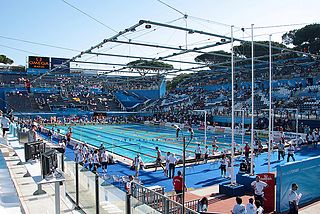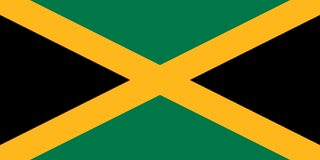
Natalie du Toit OIG MBE is a South African swimmer. She is best known for the gold medals she won at the 2004 Paralympic Games as well as the Commonwealth Games. She was one of two Paralympians to compete at the 2008 Summer Olympics in Beijing; the other being table tennis player Natalia Partyka. Du Toit became the third amputee ever to qualify for the Olympics, where she placed 16th in the 10km swim.

Australia has participated officially in every Paralympic Games since its inauguration in 1960 with the exception of the 1976 Winter Paralympics.

Swimming at the 1960 Summer Paralympics consisted of 62 events, 32 for men and 30 for women.

The United Kingdom of Great Britain and Northern Ireland has participated in every summer and winter Paralympic Games.

France competed at the inaugural Summer Paralympic Games in 1960 in Rome. France's six athletes competed in four sports: archery, athletics, dartchery and swimming. All of France's athletes obtained medals in every event they competed in.

Rhodesia competed at the inaugural Summer Paralympic Games in 1960 in Rome. It was the only African country to take part. Rhodesia sent two competitors to the games, one of whom was Margaret Harriman, who competed in archery and swimming. Harriman won a total of five medals, placing her country 11th out of 17 on the medal table. She took gold in both the archery events she participated in, and won a silver medal and two bronze in swimming.

Finland participated in the inaugural Paralympic Games in 1960 in Rome, with a single representative, swimmer Tauno Valkama - who won gold in his sole event, the 50m crawl. The country was absent from the 1964 Games, but returned in 1968, and has participated in every subsequent edition of the Summer Paralympics. Finland has also taken part in every edition of the Winter Paralympics, from the first in 1976.

Finland competed at the 1968 Summer Paralympics in Tel Aviv. It was the country's second participation in the Paralympics. Despite a good result in 1960, Finland did not take part in the 1964 Games. Finland again sent just one competitor: Veikko Puputti, who entered the men's javelin and club throw. He did not win any medal.

Finland competed at the 1976 Summer Paralympics in Toronto. The country was represented by 50 athletes competing in archery, athletics, dartchery, swimming, table tennis, volleyball, weightlifting and wheelchair basketball.

Israel, participated in the inaugural Paralympic Games in 1960 held in Rome, Italy. The 1960 Paralympics, now considered to have been the first Paralympic Games, were initially known as the ninth Stoke Mandeville Games, an event for athletes with disabilities founded in Great Britain in 1948.

Great Britain was one of twenty-eight nations to send athletes to the 1968 Summer Paralympics in Tel Aviv, Israel from November 4 to 13, 1968. The team finished second in the medal table and won sixty-nine medals: twenty-nine gold, twenty silver and twenty bronze. Athletes from the whole United Kingdom, including Northern Ireland, were able to compete for the team. Seventy-five British athletes took part in the Games; fifty-one men and twenty-four women.

Jamaica was one of twenty-eight nations that competed at the 1968 Summer Paralympics in Tel Aviv, Israel from November 4 to 13, 1968. The team finished fourteenth in the medal table and won a total of five medals; three gold, one silver and one bronze. Eleven athletes represented Jamaica at the Games; seven men and four women.

Argentina was one of the seventeen nations that competed at the inaugural Summer Paralympic Games in 1960 held in Rome, Italy, from September 19 to 24, 1960. Preparations for the Games began two years prior in 1958 to stage what was at the time called the 9th Annual International Stoke Mandeville Games. The team finished tenth in the medal table with a total of six medals, two gold, three silver and one bronze. The Argentinian team consisted of five athletes, one man and four women.

The 1996 Summer Paralympics were held in the United States city of Atlanta. Australia competed in 13 of the 17 sports, winning medals in 10 of those sports. At the 1996 Summer Paralympics, Australia had the second highest medal tally of any country competing. It won 42 gold, 37 silver and 27 bronze medals. It surpassed the 24 gold medals that Australia won at the 1992 Paralympics. The sports of athletics, swimming and cycling provided Australia with the majority of its medals.

Elizabeth Mary Edmondson PLY is an Australian Paralympic competitor and current Australian Masters competitor in swimming. She became a paraplegic after contracting polio as a small child. She won several medals in the 1964 and 1968 Summer Paralympics. She subsequently retired from swimming, only taking up the sport again in 2006 to compete in the 2008 FINA World Masters Championships in Perth.

Also known as the 13th Stoke Mandeville Games, the 1964 Summer Paralympics was the 2nd Paralympic Games. Hosted in Tokyo, the games ran from 8 to 12 November. Australia won a total of 30 medals and finished fourth on the medal tally behind Italy (3rd), Great Britain (2nd) and the United States (1st). Australia competed in 6 of the 9 sports at the Games, winning medals in each of those sports, but was most successful in the pool, winning a majority of their medals in swimming events.

Czech Republic competed at the 2004 Summer Paralympics in Athens, Greece. The team included 65 athletes, 45 men and 20 women. Competitors from Czech Republic won 31 medals, including 16 gold, 8 silver and 7 bronze to finish 12th in the medal table. Among them was the flag bearer of the Czech team, Roman Musil – the most successful Czech Paralympian at the Sydney games.

Malta sent a delegation to compete at the 2012 Summer Paralympics in London, United Kingdom, from 29 August to 9 September 2012. This was the country's eighth appearance in a Summer Paralympic Games. The Maltese delegation consisted of a single short-distance swimmer: Matthew Sultana. In his three events, the men's 50 metres freestyle S10, the men's 100 metre butterfly S10 and the men's 100 metre breaststroke SB9, he failed to qualify beyond the first round.
Zheng Tao is a Chinese para swimmer and five-time Paralympic champion. He is known as the "armless swimmer". He made a world record by winning 4 gold medals in Tokyo 2020 Paralympic.














